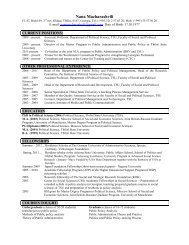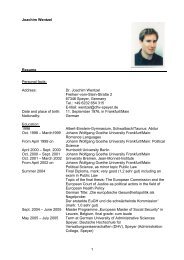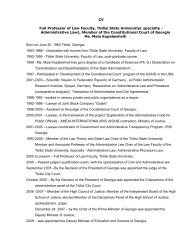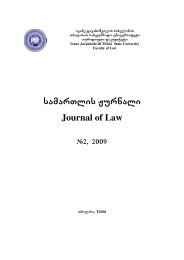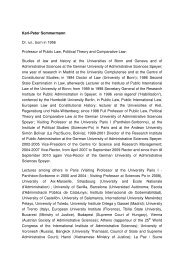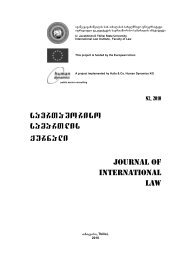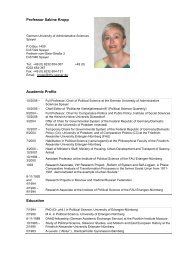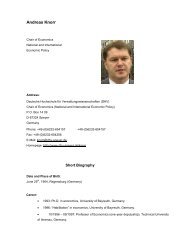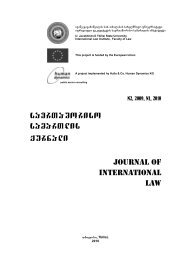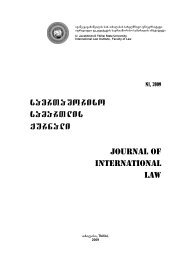Untitled
Untitled
Untitled
You also want an ePaper? Increase the reach of your titles
YUMPU automatically turns print PDFs into web optimized ePapers that Google loves.
saerTaSoriso samarTlis Jurnali, #1, 2008 JOURNAL OF INTERNATIONAL LAW, N1, 2008<br />
international treaties not from the transformation<br />
point, but from the moment of ratification.<br />
Such cases, definitely, does not constitute<br />
dualism”. 24<br />
A. Cassesse on the one hand declares<br />
that “most States do not accord primacy to international<br />
riles in their national legal systems.<br />
Thus, it may be concluded that most members<br />
of the world community tend to play down the<br />
possible role of international legal standarts<br />
in their domestic legal setting. It does not follow,<br />
however, that they normally and systematically<br />
disregard international norms. The<br />
contrary is rather the rule. The failure of States<br />
to accord to international law pride of place at<br />
home only means that they fo not intednd ti<br />
the their hands formally, at the constitutional<br />
or legislative level. In other words, subject to<br />
the few exceptions already referred to, States<br />
ultimately prefer not to enshrine in their constitutions<br />
or in their laws a firm and irrevocable<br />
commitment to unqualified observance of<br />
all international rules”.<br />
On the other hand he recognizes that “we<br />
are faced with a phenomenon of increasing<br />
importqnce: there are more and more international<br />
rules that address themselves directly<br />
to individuals, either by imposing obligations<br />
or by granting rights. These rules intend to,<br />
and to, reach individuals directly, that is, not<br />
through the medium of the municipal law of<br />
States. They ar thus operative as soon as they<br />
emerge, regadless of what is provided for in<br />
any particular national legal systems, and even<br />
contraty to possible national rules”. 25<br />
The transformation, which the Soviet doctrine<br />
of international law experienced 26 , is interesting,<br />
as it rejected both directions of the<br />
monist theory and only partially shared the<br />
dualist approach. The Soviet scientists considered<br />
international and domestic law, as<br />
“separate systems of law” 27 , however at the<br />
same time they distanced themselves from the<br />
dualism traditional doctrine as well due to the<br />
ideological differences. According to them, “the<br />
difference of “realistic dualism” (as they were<br />
referring to their concept) from the traditional<br />
is that the Socialist science studies as international,<br />
as well as domestic laws in the system<br />
of socialist connections and thus goes<br />
beyond the concrete, pure legal aspects of<br />
their interrelation».<br />
According to the soviet scientists, this circumstance<br />
was giving a possibility to explain<br />
the true reasons of these interrelations. A.<br />
Gaverdovsky, who devoted not one work to<br />
the problem, among them the monograph “The<br />
implementation of international norms”, wrote<br />
that when analyzing the correlation of the international<br />
land national laws, the socialist legal<br />
doctrine derives from the principle of the<br />
state sovereignty, and considers international<br />
and domestic laws as two independent and<br />
separate from each other systems, which are<br />
closely interrelated. 28<br />
Soviet scientists were based on the Marxist<br />
concept of the state sovereignty and agreed<br />
with dualists that international law and domestic<br />
law are two independent legal systems. At the<br />
same time they shared the view that despite<br />
the fact that the two systems are isolated from<br />
each other, there still is a close link in between<br />
the systems. 29<br />
V. Butkevich has mentioned that “the dualists<br />
are so much entertained with studying<br />
the characteristics of the relation of international<br />
and domestic laws … that they did not<br />
consider the existence of the correlation of<br />
these legal systems and their elements would<br />
be possible”. 30<br />
However, if there is the correlation in between<br />
the legal systems, it must be regulated<br />
in accordance with the hierarchy of norms.<br />
This issue remained open in the soviet scientific<br />
theory. In other words, the soviet school<br />
did not share the orthodox dualism (Anzilotti), as it<br />
did not reject the interrelation of the international<br />
and domestic laws and therefore recognized<br />
the collision in relation of these systems.<br />
The soviet scientists were drawing the<br />
conclusions as follows: “Any state must fulfill<br />
the international legal norms, international<br />
treaties and obligations in good faith. However,<br />
at the same time only such international<br />
norm has a real force and moral authority<br />
which does not impose the will of other state<br />
over a sovereign state and does not conflict<br />
with the state order and legal system”. 31<br />
After the dissolution of the Soviet Union<br />
and creation of the independent Russian<br />
state, even though the Russian scientists still<br />
“share” the dualist theory, new elements appear<br />
in their concepts. They more and more<br />
frequently appeal to the elements of the concept<br />
of the primacy of international law. When<br />
discussing the problem of interrelation<br />
Chernichenko pays attention at the terminology.<br />
According to him, this refers not to the<br />
26



